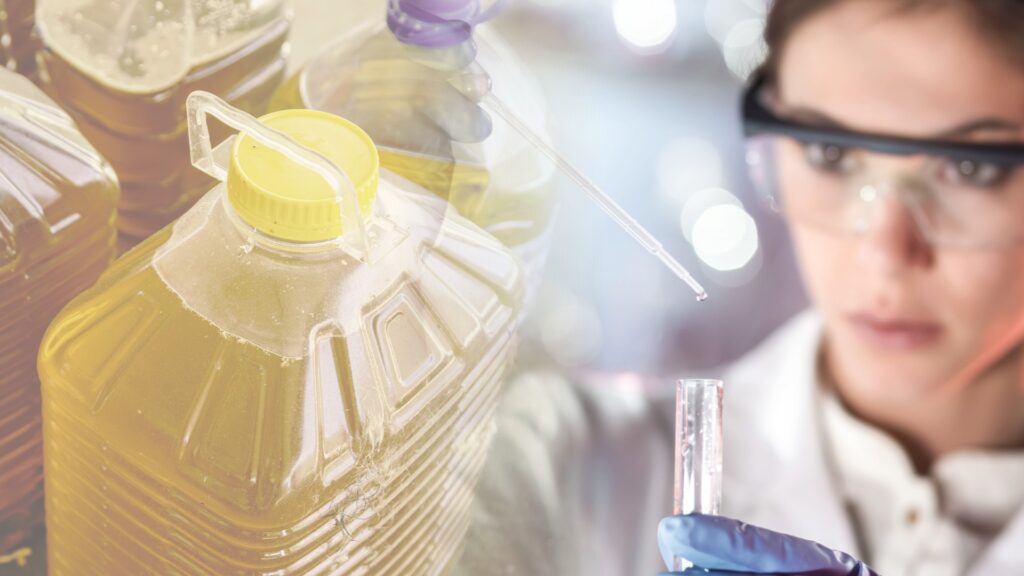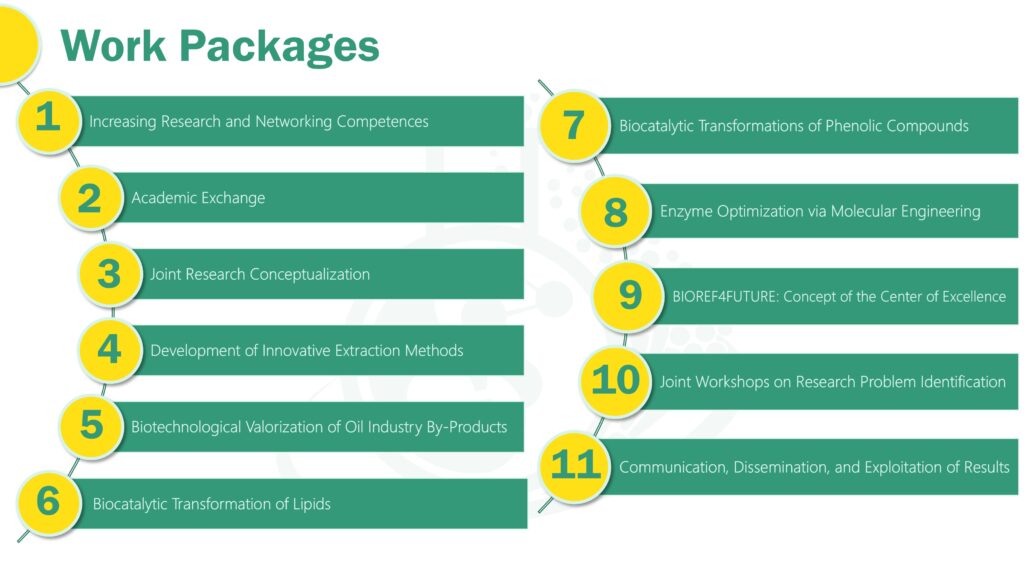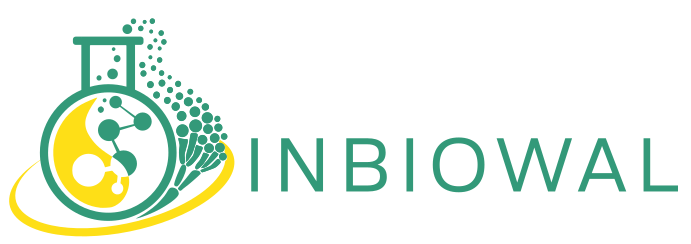From Industrial Waste to Sustainable Value – INBIOWAL Innovates for a Greener Future
PROJECT Overview
INBIOWAL is an ambitious international research initiative that focuses on sustainable solutions for managing industrial waste. Funded by the NAWA (Polish National Agency for Academic Exchange) program, with a budget of €450,000, the project brings together six leading institutions from five countries: Poland, Sweden, Italy, Croatia, and Australia.
Project Partners:
- Wrocław University of Environmental and Life Sciences (UPWr)
- University of Zagreb (UniZg)
- Swedish Centre for Resource Recovery at University of Borås (SCRR)
- Consiglio Nazionale delle Ricerche – Istituto di Scienze e Tecnologie Chimiche “Giulio Natta” (SCITEC-CNR)
- Politecnico di Milano (POLIMI)
- University of Queensland (UQ)
Each partner contributes unique expertise in biotechnology, green chemistry, and molecular engineering to achieve a shared goal—developing innovative technologies for waste valorization.
The project addresses by-products from the oil industry, such as expeller, soapstock, and other residues. These by-products, often discarded as waste, are rich in valuable compounds that can be transformed into bioactive materials, microbial biomass, and other high-value resources.
INBIOWAL leverages advanced biotechnological methods to extract these compounds, aiming to support industries such as food production, pharmaceuticals, and cosmetics while reducing environmental impact.
Origins and Motivation
The idea for INBIOWAL originated from the need to address global waste management challenges. Industrial processes, particularly in the oil and food industries, generate significant amounts of waste, much of which remains underutilized. Recognizing the untapped potential of these by-products, INBIOWAL was conceived to bridge the gap between waste generation and sustainable resource recovery.
The project’s founding vision is rooted in the principles of a circular economy, which emphasizes the need to minimize waste and maximize resource efficiency. By focusing on innovative solutions like biocatalysis, molecular engineering, and environmentally friendly solvents (e.g., NADES), INBIOWAL is charting a new course for sustainable waste valorization.

How INBIOWAL Operates
The structure of INBIOWAL revolves around 11 Work Packages (WP), each targeting a specific area crucial to achieving the project’s objectives. These work packages not only guide the research activities but also foster collaboration, knowledge sharing, and innovation among project partners.

Core Work Packages

Increasing the research and networking competences of academic staff, PhD and MSc students.
Focus: Enhancing the skills and expertise of academic staff, PhD students, and MSc students in areas related to waste valorization.
Activities: Training sessions, interdisciplinary seminars, and networking opportunities (stationary workshops, webinars, hackathon) to boost scientific collaboration.
This work package aims to enhance the research and networking skills of academic staff, PhD students, and MSc students involved in the INBIOWAL project. Through a structured program of regular meetings, workshops, and training sessions, participants gain opportunities to develop both soft and technical skills. Key activities include biannual consortium meetings held in different countries, which feature project management discussions, competence training, and sessions on scientific proposal writing. Additionally, stationary research workshops are conducted to provide hands-on experience in innovative waste valorization techniques. These events are designed to foster collaboration across disciplines and institutions, creating a strong international network of researchers. WP1 also includes networking meetings that focus on identifying research priorities and developing strategies for joint project applications. By the end of the project, participants will have gained advanced competences, strengthening the overall impact and sustainability of INBIOWAL’s objectives.

Academic exchange of PhD students, young and experienced researchers.
Focus: Promoting the exchange of knowledge and expertise among PhD students, young researchers, and experienced scientists.
Activities: International internships, collaborative visits, and mentorship programs to foster global partnerships.
WP2 focuses on facilitating academic exchanges to support collaborative research and development. This work package offers long-term research internships for PhD students, MSc students, and early-career researchers, enabling them to access advanced facilities and infrastructure at partner institutions. Planned exchanges include eight 2-month internships and one 3-month internship, targeting key areas of waste valorization. Additionally, short-term study visits are organized for experienced researchers, ranging from 3 to 7 days, to strengthen cooperation, discuss project progress, and identify potential research areas. UPWr also hosts short-term internships for partner researchers, providing opportunities for knowledge transfer and hands-on experience with advanced laboratory techniques. These academic exchanges are complemented by organized workshops and webinars, which engage a wider audience and promote skills development. WP2 is a cornerstone of INBIOWAL’s mission to create a global network of scientists advancing sustainable innovation.

Joint Research Conceptualization
Focus: Developing a unified framework for collaborative research among partner institutions.
Activities: Defining research priorities, integrating methodologies, and setting the groundwork for innovative studies.
The Joint Research Conceptualization phase is the foundation of INBIOWAL’s scientific strategy. Starting with the project’s opening meeting at UPWr, this phase involves a series of in-depth discussions and collaborative planning sessions among consortium partners. The kickoff meeting, held in a hybrid format, establishes the groundwork for future research by aligning the goals and methodologies of all partners. Following this, eight online meetings are planned to refine the details of the research framework. These thematic working group sessions focus on critical scientific aspects, including the selection of oil industry residues for valorization, the pre-treatment of substrates, and the design of biocatalytic pathways. Discussions also address the expected products and their industrial applications, ensuring alignment with the project’s goals. WP3 ensures that all partners contribute their expertise, creating a robust and detailed plan for implementing subsequent work packages.

Development of innovative methods for isolating bioactive compounds from by-products and waste of the oil industry using natural deep eutectic solvents (NADES).
Focus: Creating eco-friendly methods to isolate bioactive compounds from oil industry by-products using Natural Deep Eutectic Solvents (NADES).
Expected Outcomes: Scalable processes for phenolics and proteins extractions applicable in cosmetics, food, and nutraceuticals.
This work package focuses on the development of eco-friendly methods for isolating bioactive compounds from oil industry by-products. Researchers at UniZg lead efforts to utilize Natural Deep Eutectic Solvents (NADES), which are biodegradable and non-toxic, as an alternative to traditional chemical solvents. These innovative techniques are designed to efficiently extract phenolic compounds and proteins from residues such as soapstock and expeller, minimizing waste and environmental impact. WP4 emphasizes the scalability of these processes, making them applicable for industrial use in sectors like cosmetics, pharmaceuticals, and food production. Researchers also explore the optimization of NADES formulations to enhance extraction efficiency and product quality. By combining advanced biotechnological methods with green chemistry principles, WP4 contributes to INBIOWAL’s mission of creating sustainable solutions for waste valorization.

Biotechnological valorization of oil industry by-products for the production of valuable microbial biomass and products of their metabolism.
Focus: Converting oil industry residues into microbial biomass and valuable metabolic products.
Applications: Sustainable non-animal based proteins, biofuels, biofertilizers, and industrial biochemicals.
This work package explores biotechnological methods to transform oil industry by-products into microbial biomass and metabolic products. Led by SCRR, WP5 focuses on developing bioprocesses that convert residues such as oil cakes and soapstock into renewable resources for industries like agriculture, bioenergy, and food production. Microorganisms are cultivated to metabolize these by-products, producing valuable compounds such as mycoproteins, biofertilizers, biofuels, and biochemicals. The research also emphasizes optimizing bioreactor conditions to maximize yield and efficiency. WP5’s outcomes align with INBIOWAL’s commitment to promoting circular economy principles, demonstrating how industrial waste streams can be effectively repurposed into high-value resources that benefit both the environment and the economy.

The use of biocatalytic processes to transform lipids isolated from oil industry waste into high-value products for industrial use.
Focus: Utilizing enzymatic processes to convert lipids from oil industry waste into industrially relevant high-value products.
Applications: Bio-lubricants, surfactants, and specialty chemicals for green industries.
WP6 focuses on using enzymatic processes to convert lipids from oil industry by-products into high-value industrial products. SCITEC-CNR leads this work package, employing advanced biocatalytic techniques in unconventional media such as NADES and ionic liquids. The research emphasizes optimizing reaction conditions to enhance the efficiency and selectivity of enzymatic transformations. Key applications include the production of bio-lubricants, surfactants, and specialty chemicals that serve as sustainable alternatives to traditional petrochemical-based products. WP6 not only advances the field of biocatalysis but also provides scalable solutions for industries seeking greener, more sustainable processes. This work package demonstrates the transformative potential of enzymatic technologies in waste valorization.

Biocatalytic transformations of phenolic compounds obtained from by-products of the oil industry to obtain compounds with added value.
Focus: Transforming phenolic compounds derived from oil industry waste into valuable bioactive compounds using enzymatic methods.
Applications: Antioxidants, preservatives, and functional additives for food and cosmetics.
WP7 is dedicated to the enzymatic transformation of phenolic compounds extracted from oil industry by-products. Led by POLIMI, this work package explores biocatalytic pathways to convert phenolics into bioactive compounds with added value, such as antioxidants and preservatives. These compounds have significant applications in the food, cosmetic, and pharmaceutical industries. Research focuses on optimizing enzyme performance in unconventional solvents, ensuring that the processes are both efficient and environmentally friendly. WP7 supports INBIOWAL’s goal of leveraging biotechnological innovation to create sustainable, high-value products from industrial residues, reducing waste and environmental impact.

The use of Ancestral Sequence Reconstruction (ASR), molecular and synthetic engineering to optimize selected enzymes used in biocatalytic transformations of lipid and phenolic compounds obtained from oil industry waste.
Focus: Enhancing enzyme stability and efficiency using advanced techniques such as Ancestral Sequence Reconstruction (ASR).
Applications: Optimized biocatalysts for lipid and phenolic transformations in industrial settings.
This work package, led by the University of Queensland (UQ), enhances enzyme stability and activity through advanced molecular engineering techniques. Using approaches like Ancestral Sequence Reconstruction (ASR), researchers improve the performance of enzymes used in lipid and phenolic compound transformations. These optimized enzymes are designed to function effectively in challenging industrial conditions, including unconventional media such as NADES and ionic liquids. WP8 not only advances enzyme engineering but also ensures that biocatalytic processes within INBIOWAL are robust, scalable, and aligned with green chemistry principles. The outcomes of WP8 play a crucial role in making industrial biocatalysis more sustainable and efficient.

The concept of creating an international Center of Excellence using biotechnological methods of valorization of by-products and waste from the oil industry (BIOREF4FUTURE).
Focus: Creating a blueprint for an international Center of Excellence dedicated to biotechnological valorization of oil industry by-products.
Vision: Establishing BIOREF4FUTURE as a hub for innovation, collaboration, and training in Central and Eastern Europe.
This work package focuses on the establishment of BIOREF4FUTURE, an international Center of Excellence dedicated to the biotechnological valorization of oil industry by-products. Led by UPWr, WP9 involves building a global platform for research and development while fostering partnerships with industry, government, and academia. The Center aims to commercialize sustainable technologies for producing high-value compounds such as bioactive materials, microbial biomass, and renewable chemicals. Efforts include identifying industrial stakeholders, organizing Academia-to-Business (A2B) meetings, and securing letters of intent to confirm long-term collaboration. BIOREF4FUTURE will serve as a hub for innovation and knowledge transfer, promoting cutting-edge biotechnological solutions and strengthening the impact of INBIOWAL’s outcomes on industry and society.

Joint workshops on identifying research problems, defining the target program in order to submit a scientific project application.
Focus: Facilitating workshops to identify critical research questions and define programs for future scientific grant applications.
Outcomes: Clear strategies for addressing waste valorization challenges through collaborative research projects.
WP10 drives collaborative efforts to identify key research problems and conceptualize innovative solutions in waste valorization. This work package includes organizing four workshops across partner countries to facilitate discussions among researchers, industry representatives, and consortium members. Topics include analyzing oil industry by-products, optimizing biocatalytic methods, and integrating solutions for biomass valorization. These workshops play a vital role in shaping future research directions and aligning consortium efforts with global funding opportunities. By fostering interdisciplinary collaboration, WP10 enables the development of a comprehensive biorefining process for agricultural and industrial residues. The ultimate goal is to submit a scientific application in one of the research programmes that combines the expertise and innovations developed throughout INBIOWAL.

Communication, dissemination and exploitation of the project results.
Focus: Sharing project outcomes with the scientific community, industry stakeholders, and the public.
Activities: Publications, conferences, and technology transfer initiatives to maximize the impact of INBIOWAL’s innovations.
This work package focuses on effectively sharing INBIOWAL’s findings with diverse audiences, including scientists, industry stakeholders, policymakers, and the general public. WP11 employs a multifaceted strategy that includes:
- A regularly updated project website showcasing achievements and events.
- Publications in peer-reviewed journals under open-access models.
- Active use of social media platforms to amplify project visibility.
- Participation in international conferences like BIOTRANS and NextGenBiocat.
Additionally, WP11 organizes events such as the “Bioactive Compounds of Natural Origin” conference and A2B meetings to maximize the industrial and societal impact of the project. By ensuring widespread dissemination, this WP enhances the visibility and relevance of INBIOWAL’s sustainable biotechnological innovations, paving the way for future collaborations and applications.
Why Work Packages Are Essential
The division into work packages allows INBIOWAL to tackle the complex problem of waste valorization in a structured and collaborative manner. Each WP has a clear focus and dedicated team, ensuring that the project achieves tangible results in research, innovation, and knowledge dissemination.
Impact and Future Directions
By integrating advanced research with practical applications, INBIOWAL is setting a new standard for waste management. The project’s outcomes will contribute to:
- Reducing environmental pollution caused by industrial waste.
- Providing industries with sustainable, high-value alternatives to traditional materials.
- Training the next generation of scientists in cutting-edge biotechnological methods.
INBIOWAL represents a critical step toward a future where industrial waste is no longer a burden but a valuable resource driving sustainable development.
